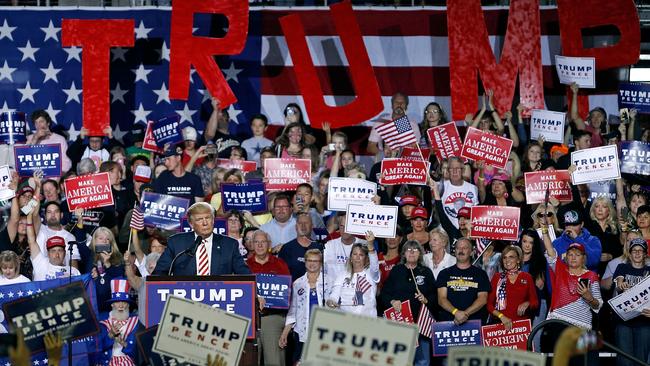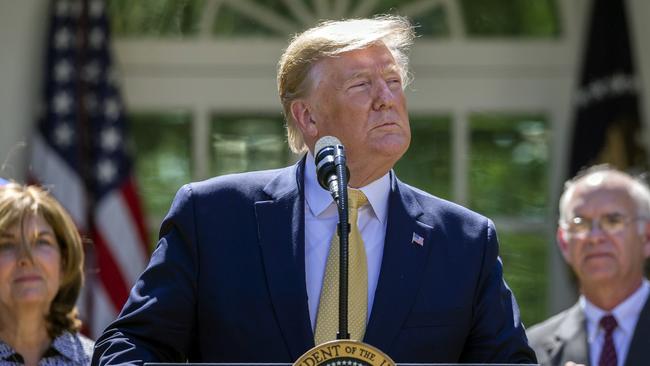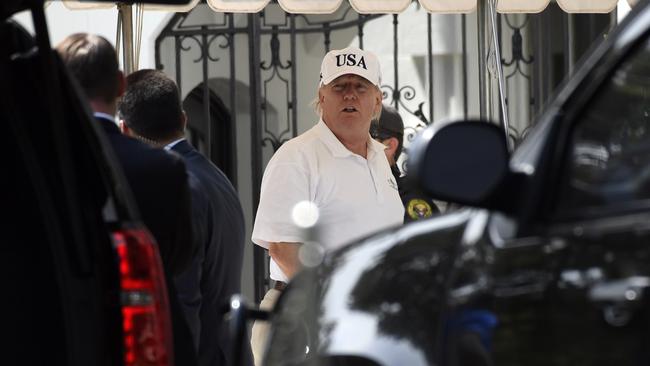Up next: four more years for Trump
Donald Trump launches his re-election bid today. Expect a far slicker, better organised and better funded affair than the chaos of 2016.

Four years ago this week, Donald Trump burst into US politics in grand style by riding down an escalator in New York’s Trump Tower to launch what seemed an unlikely bid to become the country’s 45th president.
This morning (AEST) Trump will again be the showman on an even bigger stage as he launches his re-election campaign in front of 20,000 cheering supporters in a stadium in Orlando, Florida.
The splashy event, which will also feature his wife Melania, Vice-President Mike Pence and Pence’s wife Karen, is not so much a launch of Trump’s campaign, because he has never stopped campaigning. More than any other US president in living memory, he loves to campaign and has held frequent rallies across the country during his first two years in office, often for no reason other than to keep his supporters energised.
Attacks and themes
But this rally in the key swing state of Florida is designed to fire the starter’s gun on Trump’s crusade to win a second term in November next year. It will also see Trump step up his attacks on the sprawling field of 23 Democrats lining up for their party’s nomination to take him on.
It is no coincidence that Trump’s rally comes just before 20 of those Democratic presidential contenders hold their first debates next week; the debates are expected to attract a wide audience across the country. The Orlando rally will give Americans the clearest sign yet of the themes he will hammer repeatedly during the next 16 months.
MORE: Florida crucial to Trump
Asked on Sunday what message he would give to swinging voters, Trump replied: “Safety, security, great economy. I think I’ve done more than any other first-term president ever.
“I have a phony witch-hunt, which is just a phony pile of stuff. Mueller comes out. There’s no collusion. And essentially a ruling that no obstruction. And they keep going with it. You know what? People are angry about it.”
Economy key
Trump begins his re-election campaign in the unfamiliar position of no longer being the underdog outsider. Despite historically low approval ratings throughout his turbulent presidency, Trump has had several wins this year. The most powerful win is the US economy, which is in a sweet spot not seen since the days of Bill Clinton’s presidency in the 1990s.
Trump will use his rally to remind Americans that economic growth is humming along at about 3 per cent growth, with unemployment at 3.6 per cent, the lowest since 1969. The pay packets of the lowest paid workers are growing for the first time in years. The average increase in wages in the US during the past 12 months is about 3.4 per cent, the highest in 10 years.
History shows that presidents rarely get voted out of power with economic figures such as these, although with 16 months until the election there is still enough time for the economy to cool.
Last weekend Trump tweeted that he would step up his media appearances to remind voters of the strength of the economy. “Think I will do many more Network Interviews, as I did in 2016, in order to get the word out that no president has done what I have in … the first 2½ years of his Presidency, including the fact that we have one of the best Economies in the history of our Country,” he said. “It is called Earned Media. In any event, enjoy the show!”

Mueller muted
Trump’s other big break this year — which he will hail loudly at every campaign rally — is that the report of special counsel Robert Mueller found no evidence of collusion with Russia and did not call for him to be charged with obstructing justice. From Trump’s perspective, the shades of grey in the Mueller report are irrelevant.
The fact Mueller came to no conclusion about obstruction and chose not to declare Trump innocent of obstruction will not stop the President from adopting the simple and effective mantra of “no collusion, no obstruction” throughout his campaign. What’s more, Trump will use Mueller’s report and the ongoing inquiries against him by Democrats in the House of Representatives to portray himself as a victim of a witch-hunt by left-leaning creatures of the “Washington swamp”.
Trump begins his re-election campaign with an approval rating of 42.6 per cent, according to the polling group Fivethirtyeight. This is almost the same as it was 12 months ago and it has rarely moved out of the 40-45 per cent range during his presidency.
This is consistently lower than that of most presidents in the modern era, a fact the Democrats say makes it difficult for him to win a second term. But other presidents have had similarly low approval ratings at this stage of their presidency and have gone on to win a second election.
At this stage of his first term, Ronald Reagan had an almost identical approval of 43.1 per cent compared with Trump’s 42.6 per cent. Bill Clinton and Barack Obama were only a little higher at 46.4 per cent and 47.7 per cent respectively. Each went on to be elected for a second term. Incumbency gives Trump an instant advantage. In the past 40 years only two presidents — George HW Bush and Jimmy Carter — have not won a second term.

Funding and planning
The drive for re-election will be a far slicker, better organised and better funded affair than Trump’s chaotic 2016 campaign.
For a start, the 2020 campaign team will not be housed in a cramped corner of Trump Tower. Dozens of advisers are working from spacious new campaign headquarters in Arlington, Virginia, overlooking the Potomac River.
From these offices they have been working with the Republican National Committee to raise a hefty $US82 million ($119m) to conduct a well-funded and more strategically targeted campaign.
The campaign manager is businessman Brad Parscale, who served as digital media director in the 2016 campaign. He leads a 50-strong operation with a more traditional chain of command.
“In 2016, the people on the campaign like to say that they were building the aeroplane while it was in flight. This time, he will have a campaign that is befitting of an incumbent president of the United States,” says Tim Murtaugh, communications director for the Trump campaign.
Republican campaign staff say a key theme of Trump’s campaign will be that he has kept his election promises.
Promises kept
Trump enjoys a 90 per cent approval rating among Republican voters because he has largely done what he promised them in 2016.
This includes stimulating the economy by cutting taxes and regulations; creating jobs and wages growth; demoting environmental and climate change issues; withdrawing from the Trans-Pacific Partnership; taking on China over trade; redrawing the North American Free Trade Agreement; starting his border wall; increasing funding for the military; moving the US embassy in Israel to Jerusalem; and withdrawing from the Iran nuclear deal, among others.
While Trump’s opponents dislike this agenda, it is difficult to argue that he has not kept his campaign promises to those who voted him into power. For this reason he will campaign heavily on his record. Trump also may benefit politically from the one significant area where he has struggled to keep his promise: his inability to secure the border and curb the flow of unauthorised migrants into the US from Mexico.
Trump will use his rallies during the coming year to blame others for this outcome. First he will blame the Democrats for blocking policies that would have curbed the flow of migrants. These include more funding for his border wall — an impasse with the Democrats that led to a government shutdown of record proportions.
Trump also will blame Mexico, arguing he has forced a complacent neighbour to take tougher action through his unorthodox threats to close the border and to impose tariffs on Mexico unless it did more to secure the border.
Trump’s campaign officials say his central campaign themes will be the economy, jobs, immigration and border security, and his “America first” approach to trade and foreign policy.
The other half of Trump’s campaign message will be that the Democrats cannot be trusted with the economy, with border security or on foreign policy issues such as China and Iran. He already has labelled many of the more liberal Democrat contenders, such as Bernie Sanders and Elizabeth Warren, as extremists and socialists, with their calls for universal healthcare and higher taxes.
Democrat divisions
Trump will use these next six months to exploit and fuel the deep divisions among the Democrats over issues, including whether to launch impeachment proceedings against the President.
In particular he will watch carefully how next week’s Democratic Party debates shape the race. Trump has already coined derogatory campaign names for his closest Democratic competitors including “sleepy” Joe Biden and “crazy” Bernie Sanders.
The incumbent’s path back to the Oval Office is an uncertain one because his razor-thin victory in 2016 means he needs to grow rather than merely maintain his base.
Last year’s midterm elections saw a swing to the Democrats and recent polls show Trump is struggling for support in the key swing states of Pennsylvania, Wisconsin and Michigan. But Republicans are quietly confident that he is well placed to win a second term on the grounds that more Americans will reward him for his achievements than punish him for his controversial and chaotic style.
Trump’s marathon race for the White House is about to begin and promises to be no less compelling than it was in 2016.
Cameron Stewart is also US contributor for Sky News Australia.


To join the conversation, please log in. Don't have an account? Register
Join the conversation, you are commenting as Logout